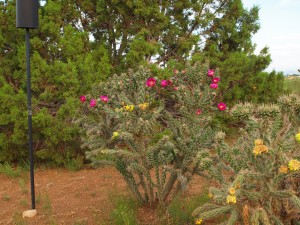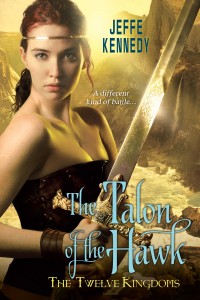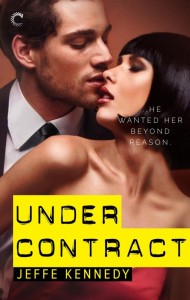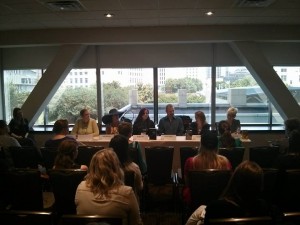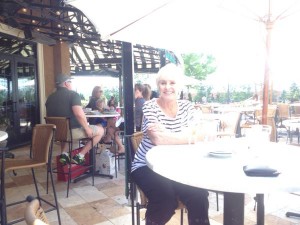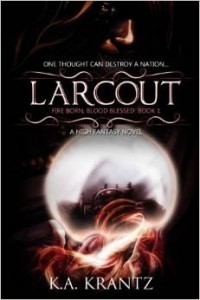
I’ve been friends with K.A. Krantz for, wow, six years now? We’ve been critique partners and sister Word Whores all this time. And now she’s come out with her epic fantasy debut! SO excited for her!
So we took some time to pour some wine in our respective time zones and had an Instant Messenger chat about warrior heroines.
Jeffe: So, tell us about Larcout!
K.A. KRANTZ: Larcout is the story of a fire-warrior, who shields her slaves from the lethal amusements of her kin in hopes that protecting them will prove to the gods that she’s worthy of freedom from their mountain prison.
Jeffe: What is a fire warrior?
K.A. KRANTZ: most people have blood in their veins, Vadrigyn–our protagonist–has fire, and that fire demands domination and destruction.
Jeffe: so she’s a badass?
K.A. KRANTZ: Oh yeah. She can kill you with a touch thanks to venomous parasites that live in her hands.
Jeffe: nice
K.A. KRANTZ: As the only fire-warrior without wings, she’s had to learn to not only protect herself, but to standup for what and who believes in…which just happens to be her. Not unlike your warrior princess Ursula.
Jeffe: heh. Only Ursula had to train all her life for her warrior skills – no handy venomous parasites
K.A. KRANTZ: Oh, Vadrigyn’s had to train. She comes from a kill or or be killed society.
Jeffe: Aha! does she follow a particular martial system, as Ursula does? Ursula’s is tied in with the folowers of the warrior-goddess Danu, she of the bright blade and clear eyes
K.A. KRANTZ: Fire-warriors are the children of the Goddess of Instigation, the only feminine deity among five gods. There aren’t acolytes and priests in her native culture. They simply adhere to the demands of their essential fire. However, Vadrigyn is wingless because she’s a mixed-breed…a product of blood-being mother and a fire-warrior father.
Jeffe: sounds like a tricky relationship
K.A. KRANTZ: Let’s just say Mom doesn’t bake cookies. She’s a sociopath with magic of mind-control.
Jeffe: Ursula is mixed-breed, too, interestingly enough, with her Tala shapeshifter sorceress mother and (mostly) human father
Jeffe: Interesting that our warrior-heroines both have powerful mothers!
K.A. KRANTZ: We don’t do weak women.
Jeffe: No doubt part of why we are friends!
K.A. KRANTZ: LOL! True!
K.A. KRANTZ: But it’s important to show women with agency–whether they’re wielding weapons or using the strength of their character to pursue their happiness–it’s important.
K.A. KRANTZ: Did I mention, it’s important?
Jeffe: Important, you say?
K.A. KRANTZ: yeesh, lemme be a bit more redundant.
Jeffe: I’m totally keeping this
K.A. KRANTZ: you would
K.A. KRANTZ: ’cause it’s important
Jeffe: as a woman with agency
K.A. KRANTZ: and a wine glass
Jeffe: so, let’s talk about that – WHY is it important? ~slurps wine~
K.A. KRANTZ: There are rumblings out there that we — writers, we — are cementing a masculine woman as the ideal stereotype. She has physical strength on par with men. Excels in combat the same way as men. Views combat in the same way as men. We’re being accused of slapping tits on a dude and calling it “strong female protagonist.”
Jeffe: I’m restraining myself from making a nasty comment to that
K.A. KRANTZ: Yeah, I know you are ’bout to ‘splode over that notion.
Jeffe: Well, it’s RIDICULOUS. As if all of these male superheroes are totally believable. No, no – it’s PERFECTLY realistic for a guy to get bitten by a radioactive spider and become superhuman
K.A. KRANTZ: My answer to that is, “then you’re missing the entire scope of the internal conflict.”
Jeffe: Because the internal conflict is heightened and exacerbated by that tension between gender and ability?
K.A. KRANTZ: Yes. Because of external expectations of the surrounding characters (which may or may not reflect the expectations of certain readers). Vadrigyn spends the bulk of her life defining expectations because she looks like no one and nothing else.
Jeffe: Ah, interesting
K.A. KRANTZ: The only thing of which anyone is certain is that she’s a woman.
Jeffe: because no penis?
K.A. KRANTZ: Yep. They choose to make that her defining characteristic.
Jeffe: This is one of Ursula’s issues, too. She’s the heir to the High Throne, but grudgingly so. Her father really wanted a boy to succeed him. And all the jokes are that she sleeps with her sword and likes that better than having a man in her bed
K.A. KRANTZ: and if she’s not fucking anything with three legs, she’s less of a woman
Jeffe: That implication is there, yes, though there’s less stigma to it in her culture. Mostly she doesn’t hook up with *anyone* and no one can figure why. But then, many of the followers of Danu are celibate
K.A. KRANTZ: The issue of celibacy is an interesting choice to make for your character(s). Deliberate?
Jeffe: Well, as you know, I don’t do much deliberately. Ursula insisted on that truth. She has been celibate, but for other reasons. The High King wouldn’t allow her to take the actual vow. Though she would have, if she could
K.A. KRANTZ: It’s so interesting to balance the ramifications in our western sexually-driven society. For Vadrigyn, sex is a matter of domination, not a demonstration of intimacy
Jeffe: ooh, that IS interesting
K.A. KRANTZ: It’s something those around her fail to understand
Jeffe: does she have sex with males or females – both?
K.A. KRANTZ: Well, she has a small problem what with that fatal touch thing
Jeffe: oh RIGHT! eep
K.A. KRANTZ: but intimacy, actually experiencing true intimacy, is completely foreign to her. It’s a challenge with which she struggles throughout the book – non-sexual intimacy, that is. (and sometimes almost sexual)
Jeffe: she sounds like a very alone person – which is also Ursula
K.A. KRANTZ: I think loneliness is a result of taking the uncommon path
Jeffe: That’s a very good point
Jeffe: For Ursula, it’s also about protecting herself and others, which I think is consistent with many male warrior heroes. There’s always that sense of social isolation
K.A. KRANTZ: there’s a quote out there by Paul Tillich. “Loneliness expresses the pain of being alone and solitude expresses the glory of being alone.”
Jeffe: love it! So, let me ask you this – was it fun to write your warrior heroine?
K.A. KRANTZ: oh, fuck yeah
Jeffe: ha! tell me why
K.A. KRANTZ: there other women in the book, each strong in her own way, each vulnerable in her own way, but for Vadrigyn, she began as anti-hero. The story is told solely from her perspective, so she (hopefully) doesn’t come across as evil. But if you were an outsider living the results of what she does, you might think she’s less than admirable. And that was the fun part of writing her. As writers we’re always told to make sure our villains have their own valid, relatable reasons for doing what they do…
Jeffe: that brings me back to an earlier thread, about non-warrior women having agency, too. For example, my most-beautiful and most-spoiled princess, Amelia, is decidedly NOT a warrior – and not at all admirable to begin with
K.A. KRANTZ: Amelia may not wield a sword, but she is forced into certain conditions that demand bravery
Jeffe: yes! And that, to me, is really the crux – that finding bravery
K.A. KRANTZ: and she rises to the occasion(s), and I think that is what all women can relate to–rising to the call
Jeffe: Amelia wields a hairbrush, but she is a goddamn MASTER of it!
K.A. KRANTZ: Do not underestimate the damage a brush can do!
Jeffe: INDEED
K.A. KRANTZ: (Believe me, I have those kind of brushes)
Jeffe: Ha!
Jeffe: so, to wrap up. ARE we slapping tits on a male hero?
K.A. KRANTZ: I don’t think so. I like to think we’re challenging the definitions of femininity.
Jeffe: Which are arguably limited
K.A. KRANTZ: As long as our heroines are defined by more than who they fuck and how they look, then we’re making progress.
Jeffe: Right. The Bechdel Test is a good starting place, but it’s really the bare minimum
K.A. KRANTZ: Let me ask you this: if you changed Ursula’s name to Uri, and all her pronouns to “he”… would she read like a dude? Would The Talon of Hawk become a M/M fantasy romance?
Jeffe: Oooh, interesting question. No. No, I really don’t think so. Ursula is profoundly female in certain ways.
K.A. KRANTZ: That, I think is a test more authors should use.
Jeffe: I love this idea!
K.A. KRANTZ: I’ll be interested to know from the readers if V passes that test!
Jeffe: I’m so excited that this book is out in the world!
K.A. KRANTZ: Aww, bless you and thank you!
Jeffe: I read an early draft, and I’m really excited to see the final creation. I loved it then – I’m sure it’s stellar now
K.A. KRANTZ: It’s come a long way since you braved a full reading of it – “Hey, K.A. KRANTZ, it’s fun…but is there a …plot?”
Jeffe: lol! I said more than THAT
K.A. KRANTZ: lol, that’s true! very true
Jeffe: Well, you *asked*! And there’s a happy ever after – it’s out now! Check this out, peoples:
Blood-beings can be chattel or char. Fire seethes through the veins of every Morsam, demanding domination and destruction. Combat is a hobby. Slaughtering the inferior blood-beings is entertainment. Life is a repetitious cycle in the prison fashioned by the gods. But mix-race abomination Vadrigyn os Harlo suspects the key to freedom lies with safeguarding the blood-beings; until her blood-born mother uses foreign magic to turn the Morsam against Vadrigyn. Betrayed, bound, and broken, Vadrigyn struggles against the dying of her essential fire. The ebbing flames unleash the dormant magic of her mixed heritage… The magic to destroy free will. Seized by the gods and dumped in the desert nation of Larcout to stop history from repeating, Vadrigyn discovers her mother’s legacy of treason and slaughter still festers. To survive the intrigues of the royal court, the roiling undercurrents of civil war, and the gods themselves, Vadrigyn must unravel the conspiracy behind her mother’s banishment. But manipulating free will unleashes a torrent of consequences. If she fails the gods, she will return to the Morsam prison, stripped of all magic and all hope. If she succeeds, she can rule a nation. Kasthu. Roborgu. Inarchma. Live. Learn. Burn.
Buy it here!
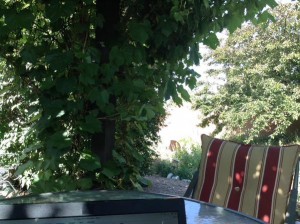 So, yesterday I finished writing THE PAGES OF THE MIND!
So, yesterday I finished writing THE PAGES OF THE MIND! 